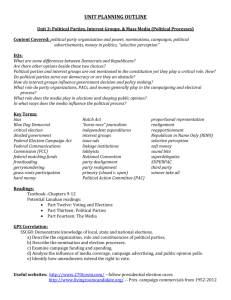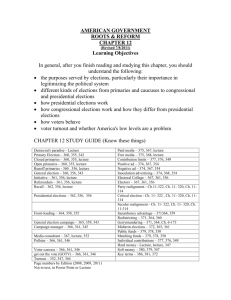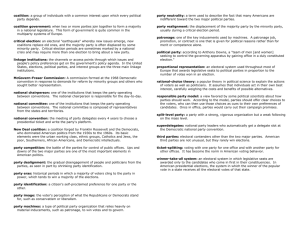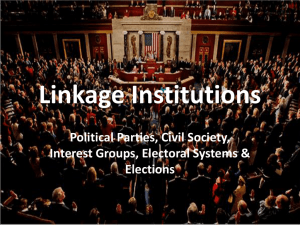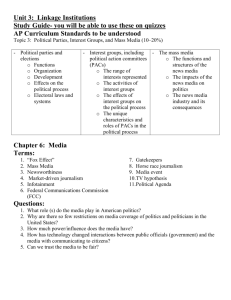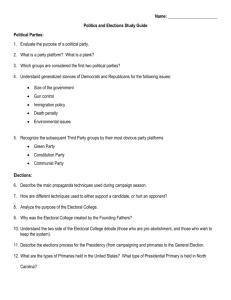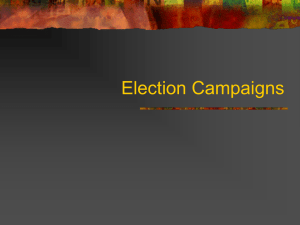BrionesLinkages: ElectionsAPG Elections (ch 9, 10): OBJECTIVES
advertisement
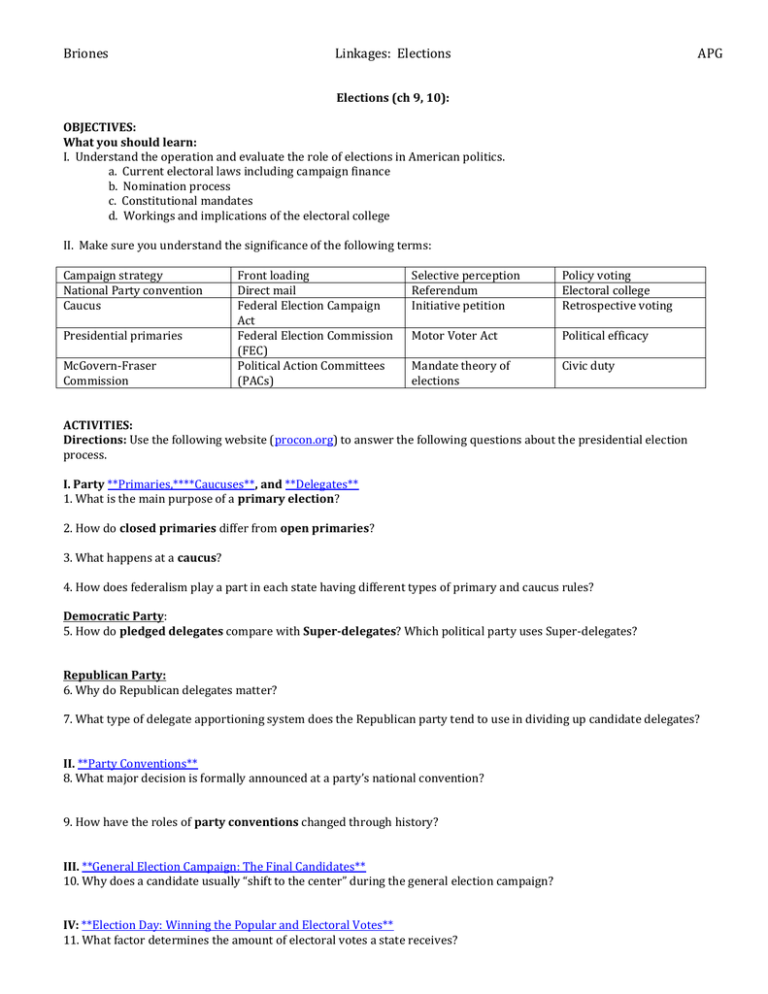
Briones Linkages: Elections APG Elections (ch 9, 10): OBJECTIVES: What you should learn: I. Understand the operation and evaluate the role of elections in American politics. a. Current electoral laws including campaign finance b. Nomination process c. Constitutional mandates d. Workings and implications of the electoral college II. Make sure you understand the significance of the following terms: Campaign strategy National Party convention Caucus Presidential primaries McGovern-Fraser Commission Front loading Direct mail Federal Election Campaign Act Federal Election Commission (FEC) Political Action Committees (PACs) Selective perception Referendum Initiative petition Policy voting Electoral college Retrospective voting Motor Voter Act Political efficacy Mandate theory of elections Civic duty ACTIVITIES: Directions: Use the following website (procon.org) to answer the following questions about the presidential election process. I. Party **Primaries,****Caucuses**, and **Delegates** 1. What is the main purpose of a primary election? 2. How do closed primaries differ from open primaries? 3. What happens at a caucus? 4. How does federalism play a part in each state having different types of primary and caucus rules? Democratic Party: 5. How do pledged delegates compare with Super-delegates? Which political party uses Super-delegates? Republican Party: 6. Why do Republican delegates matter? 7. What type of delegate apportioning system does the Republican party tend to use in dividing up candidate delegates? II. **Party Conventions** 8. What major decision is formally announced at a party’s national convention? 9. How have the roles of party conventions changed through history? III. **General Election Campaign: The Final Candidates** 10. Why does a candidate usually “shift to the center” during the general election campaign? IV: **Election Day: Winning the Popular and Electoral Votes** 11. What factor determines the amount of electoral votes a state receives? Briones Linkages: Elections APG 12. Who/what are voters actually choosing when they select a presidential ticket (president & vice president)? 13. What factor determines how a ticket wins a state’s electoral votes in 48 of the 50 states? 14. How many electoral votes does a presidential ticket need to win? What happens if no ticket wins the minimum amount of electoral votes? Read chapter 9, analyze graphics & answer the following: 1. List the ways in which presidential and congressional campaigns differ. 2. How is running in a caucus or a primary different from running in the general election? 3. Why do elections have so little impact on public policy? (Question is out of order) 4. What has been the effect of TV on campaigns? List as many effects as you can. 5. What was in the Federal Election Campaign Act that was passed after Watergate? What were the consequences of that law? Define independent expenditures and soft money. 6. What changes did the Bipartisan Campaign Finance Reform Act of 2002 (BCRA) make in how campaigns could be financed? 7. What were the consequences of BCRA? 8. What are 527s are and what role do they play in elections? 9. Study the purple box on p. 256. You need to know Buckley, McConnell, and Citizens United. Summarize their effects. 10. What does the book say are the three factors that determine peacetime presidential elections? Which group normally decides elections? How do the economy and character affect elections? What other factors play a role? 11. What are the three reasons that the book gives for why party identification doesn’t determine who wins elections? 12. How did the elections of 1896 and 1932 qualify as party realignments? 13. Describe how presidential candidates implement their campaign strategies.

